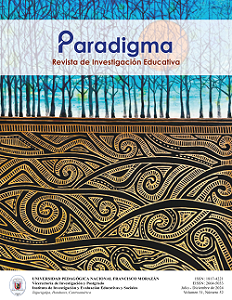Mirror classes and COIL: cooperative and collaborative sceneries of the intercultural competence
DOI:
https://doi.org/10.5377/paradigma.v31i52.19501Keywords:
education and culture, intercultural communication, language teaching, cultural cooperationAbstract
In this essay there will be presented the importance of employing virtual internationalization strategies known as mirror classes or classrooms and COIL, jointly, to be used as suitable spaces for teaching foreign languages, in general, and developing intercultural competence. To this end, the theoretical panorama of each of the terms involved is evidenced: intercultural competence, collaboration, and cooperation, highlighting the dialogue of these terms and their importance in language teaching. Furthermore, the development of intercultural competence in cooperative and collaborative work that can be found in each strategy, and the correlation of the elements of intercultural competence, collaboration, and cultural cooperation are in the virtual exchanges of the groups where education and culture converge, specifically in those dynamics typical of foreign language classrooms.
Downloads
346
Downloads
Published
How to Cite
Issue
Section
License
Copyright (c) 2024 Universidad Pedagógica Nacional Francisco Morazán

This work is licensed under a Creative Commons Attribution-NonCommercial-NoDerivatives 4.0 International License.
Transfer of Copyright
- The author, when sending the work, states that it is his will to give the Universidad Pedagógica Nacional Francisco Morazán the patrimonial rights that correspond to him as the author of his work.
- The rights here assigned include all economic rights (Reproduction, transformation, public communication and distribution) and are given without limitation in terms of territory; This Assignment is given for the entire duration term established in the current legislation in Honduras.
- The cession of the aforementioned rights does not imply the cession of moral rights over it, because in accordance with the provisions of the Copyright and Related Rights Law, Chapter II, of the Moral Rights, Article 34, Article 25 , these rights are inalienable, imprescriptible, indefeasible and inalienable.
- The research work or document must be original and have been done without violating or usurping rights of third parties, therefore, the work is exclusively authored and owns the same.
- In the case of any claim or action by a third party, as to copyright on the work in question, the author must assume full responsibility for the rights assigned.
- Upon completion of the Rights Assignment Form, the author states that the work has not been published in another way, that the rights on the work have not been assigned and that no encumbrance or limitation on their use or use is imposed on them.





